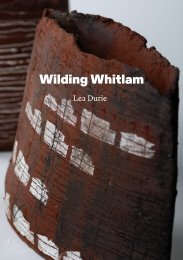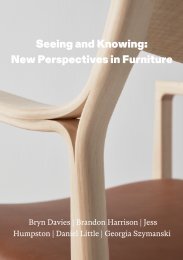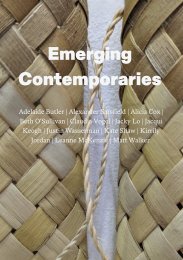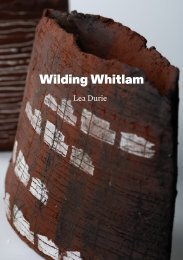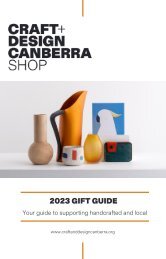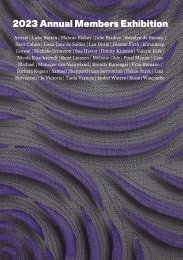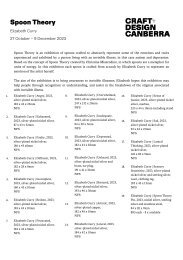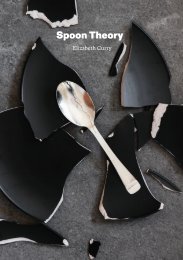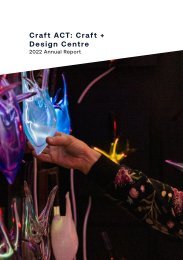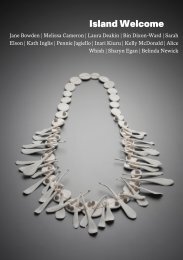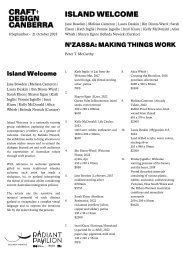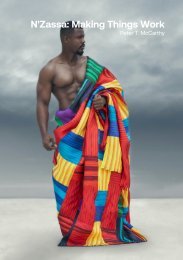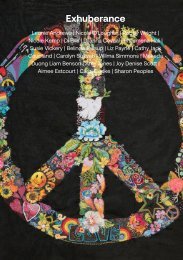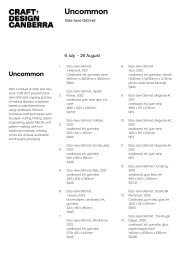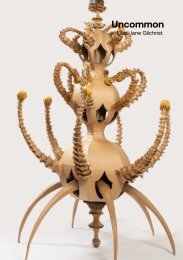Craft ACT Artist-in-residence 2014: Bogs and Fens
Sally Blake, Annee Miron and Satoshi Fujinama
Sally Blake, Annee Miron and Satoshi Fujinama
- No tags were found...
You also want an ePaper? Increase the reach of your titles
YUMPU automatically turns print PDFs into web optimized ePapers that Google loves.
<strong>Bogs</strong> <strong>and</strong> <strong>Fens</strong>: a rtist-<strong>in</strong>-<strong>residence</strong><br />
Catalogue essay<br />
What word is that?<br />
<strong>Bogs</strong>, fens <strong>and</strong> how we underst<strong>and</strong> them<br />
By Rosanna Stevens<br />
Aurally, ‘bog’ isn’t a particularly pleasant<br />
word. It’s squat <strong>and</strong> round at the front,<br />
monosyllabic, <strong>and</strong> the end of the<br />
word gets stuck <strong>in</strong> your throat – ‘bog’.<br />
Perhaps I take this view because <strong>in</strong><br />
modern Australia, the term connotes<br />
too many th<strong>in</strong>gs that are not specifically<br />
the ecology <strong>and</strong> state of a ‘wet, muddy<br />
ground too soft to support a heavy body’.<br />
‘Bog’ has always existed <strong>in</strong> my vernacular<br />
as either a figurative or slang term. In<br />
fact, I can’t recall a time where I sat <strong>in</strong> a<br />
classroom <strong>and</strong> was taught the gorgeous<br />
factual <strong>in</strong>tricacies of what a bog truly<br />
is, <strong>and</strong> how it functions. Similarly a ‘fen’<br />
is a monosyllabic term that for too long<br />
escaped me: soft, verdant <strong>and</strong> feathery<br />
<strong>in</strong> sound, the word never immediately<br />
summoned marsh or wetl<strong>and</strong>, because<br />
it summoned noth<strong>in</strong>g at all: it’s not<br />
a term we are encouraged to use <strong>in</strong><br />
pass<strong>in</strong>g conversation, unless perhaps<br />
we visited one recently on one of those<br />
marshl<strong>and</strong> holidays the tourism <strong>in</strong>dustry<br />
so commonly capitalises on.<br />
Recently, lead<strong>in</strong>g British nature writer<br />
Robert MacFarlane delved <strong>in</strong>to this<br />
change <strong>in</strong> awareness of environmental<br />
language <strong>in</strong> The Guardian. In draw<strong>in</strong>g to<br />
the public attention the loss of words<br />
that connote or describe our natural<br />
environment, he discussed the most<br />
recent edition of the Oxford Junior<br />
Dictionary, which has removed a list<br />
of nature-related terms – from acorn<br />
to willow – <strong>and</strong> replaced them with a<br />
technological lexicon. What does this<br />
loss mean? Are we forgett<strong>in</strong>g how to<br />
see <strong>and</strong> describe the very th<strong>in</strong>g that<br />
builds us <strong>and</strong> gives us life?<br />
For bogs <strong>and</strong> fens, while their exact<br />
mean<strong>in</strong>gs slowly eek from the Austral<br />
vernacular, their rich watery bodies lie<br />
patiently, still there, but <strong>in</strong>creas<strong>in</strong>gly<br />
threatened by exactly that which the<br />
Oxford Junior Dictionary has almost<br />
too poetically decided to replace<br />
environmental worlds with: human stuff.<br />
Alp<strong>in</strong>e Sphagnum <strong>Bogs</strong> <strong>and</strong> Associated<br />
<strong>Fens</strong> – those bogs <strong>and</strong> fens which<br />
specifically populate the <strong>ACT</strong> region,<br />
as well as outcrops <strong>in</strong> areas of southern<br />
New South Wales, Victoria <strong>and</strong> Tasmania<br />
– are complex ecosystems which act<br />
as significant habitats for a number of<br />
endemic plant species <strong>and</strong> threatened<br />
animals. Yet, due to their sporadic <strong>and</strong><br />
small geographic distribution, these<br />
Left: Annee Miron, Borrowed Time (detail), 2015, found cardboard <strong>and</strong> gouache.<br />
Photography: Brent Edwards.<br />
PAGE 11




